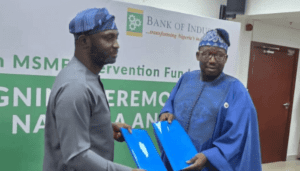
All commodity group import index rose by 1.89% in Q3 – NBS
The National Bureau of Statistics (NBS) has disclosed that all commodity import group between July and September 2020 (Q3) import index rose by 1.89 per cent driven mainly by an increase in the prices of products of the chemical and allied industries, wood and articles of wood, and live animals; animal products.
The NBS “commodity price indices and terms of trade” report that was released on Wednesday stated that, “This was driven mainly by an increase in the prices of Products of the chemical and allied industries (9.55per cent), wood and articles of wood (4.37 per cent), and live animals; animal products (4.06 per cent).
“However, it was negatively affected by decline in the prices of Prepared foodstuff: beverages (-5.07 per cent), textile and textile articles (-1.07 per cent) and Raw Hides & skins, leather (-0.92 per cent).
“Between July and August 2020, the All commodity group import index rose by 2.49 per cent. This was driven mainly by Products of the chemical and allied industries, which rose 6.8 per cent, Vegetable products (6.07 per cent) and Animal and Vegetable fats and oil (6.05 per cent) but was negatively affected by decline in prices of Prepared foodstuffs; beverages, spirits and vinegar (-5.19 per cent), Textiles and textile articles (-2.75 per cent) and Raw hides and Skin, leather, furskins etc (-2.38 per cent).”
The merchandise trade by top five partners and by major commodities, Q3 2020 stated that, “India was the largest export market of Nigeria in Q3 2020.
“Export trade to India was valued at N500.63 billion, or 16.73per cent of the value of total exports. The dominant export commodity to India was Crude oil (valued at N444.89 billion).
“This was followed by Natural gas, liquified (N49.1 0billion), Cashew nuts, in shell (N 2.18billion), Soya beans, whether or not broken (N 1.14 billion) and Leather further prepared after tanning/crusting, (N0.71billion).
“On the other hand, Nigeria imported motorcycles and cycles, CKD by established manufacturers >50cc<=250cc (worth N50.71billion), Other Antibiotics nes (N26.36billion), Vaccines for human medicine (N20.22billion) , Other Polyethylene (N9.27billion) and others from India during the period under review.
On Spain, it stated that, “Nigeria’s major export to Spain in Q3, 2020 was Petroleum oils and oils obtained from bituminous minerals, crude, valued at N282.8 billion. This was followed by Natural gas, liquefied worth N42.6 billion, Leather further prepared after tanning/crusting without wool at N 1.8 billion and others.
“During the quarter, Motor Spirit ordinary worth N20.65 billion was imported from Spain. Other imports from Spain included Mixed alkylbenzenes & mixed alkylanaphthalenes (N17.63 billion), Gypsum; anhydrite whether or not coloured, with/without small quantities of accelerators (N 4.37 billion).
“In Q3 2020, the dominant export commodity to The Netherlands was petroleum oils and oils obtained from bituminous minerals, crude (N216.7billion).
“This was followed by Natural gas, liquefied (N2.2 billion), Good Fermented Nigerian Cocoa Beans (N1.6billion), Other Frozen shrimps and prawns (N 1.2billion) and others.
“On the other hand, Motor Spirit valued at N180.7billion, Other Antibiotics valued at N79.5 billion, Gas Oil valued at N 58.8 billion, Blue whitings (Micromesistius poutassou, Micromesistius australis) meat, frozen (N10.2billion), and Motor spirit, super (N 10.1 billion) were the dominant imports from The Netherlands.
“Turkey was among Nigeria’s leading trading partners in the third quarter of 2020. Exports to Turkey was valued at N150 billion or 5.01per cent, largely dominated by Petroleum oils and oils obtained from bituminous minerals, Crude (worth N138.75 billion).
“This was followed by Natural gas, liquefied, (N9.68billion) and Sesamum seeds (N1.35 billion). On the other hand, the value of imports stood at N59.26billion representing 1.10 per cent of total imports.
“The top three import commodities from Turkey were Plasters of Calcined gypsum, Cooking Appliances, as well as Other Paper and paper board valued at N4.09billion, N2.60billion and N2.24 billion respectively.
“In Q3 2020, Nigeria’s export trade with China was dominated by Petroleum oils and oils obtained from bituminous minerals, crude which accounted for N64.1billion of exports.
“This was followed by Natural gas, liquefied (N22.5billion) and Other petroleum gases etc in gaseous state (N16.2billion).
“In terms of imports, Other instruments, appliances and machines for measuring or checking, nes, Machines for the reception, conversion & transmission or regeneration of voice, images or…, Other appliances such as taps, cocks and other valves, nes were the dominant imports, each valued at N37.2billion, N37.1billion, and N35.2billion respectively.”



